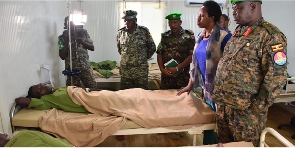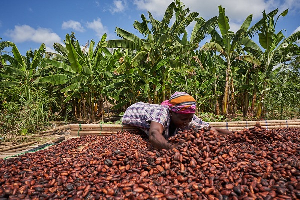Four Uganda People’s Defence Forces (UPDF) soldiers who escaped the May 26 al-shabaab onslaught on their base in Somalia, and lost contact with comrades-in-arms, say they survived for six days by drinking their own urine.
The quartet was found weak but alive, with a lieutenant among them nursing bullet wound, UPDF and Defence spokesperson, Brig Felix Kulayigye, said.
“One soldier at the rank of lieutenant was shot in the leg. He hid near the base and sent his escort to get help. The two other soldiers of lower rank hid near the base and survived on urine as food for six days,” Brig Kulayigye said.
He added: “The fourth soldier hid a bit far away from the base, but also survived by drinking their own urine.”
Harrowing details of the May 26 attack in which President Museveni, the commander-in-chief, said Uganda lost 54 soldiers, are emerging in bits after the army launched a counter-offensive and recaptured Buulo Mareer Forward Operating Base (FOB).
UPDF’s highest ranked officer at the base, posthumously identified as Lt Col Edward Nyororo from Arua, reportedly shot himself dead when it was imminent al-Shabaab was taking him as a prisoner of war.
The army, without specifying the day, said bodies of the fallen soldiers will be flown home this week.
The losses suffered when al-Shabaab fighters overran the Buulo Mareer FOB was the worst single incident of UPDF foreign assignments and the worst since it first deployed in Somalia in March 2007.
Citing pan-Africanism, Gen Museveni ordered the troops to deploy in the Horn of Africa country without parliamentary authorisation or prompt briefing as provided in the Constitution, and the soldiers have been lauded for expelling the militants from Mogadishu, the capital, and capturing their countryside territories.
The May 26 incident has reignited debate at home, including proposals by four-time presidential challenger and former Museveni’s bush-time personal physician, Dr Kizza Besigye and Mr Mathias Mpuuga, the Leader of the Opposition in Parliament, that UPDF has overstayed its welcome in Somalia and its soldiers should withdraw to prevent battlefield losses from overshadowing gains over the past 16 years.
Somalia is miles a better and safer place today, compared to 2007, largely due to the work of the Ugandan army that was the first and remains the largest contingent under African Union Transition Mission in Somalia (ATMIS), originally Amisom, according to the European Union that picks the bills and the United States that provides intelligence and technical mission support.
Other troop-contributing countries to Somalia include Burundi, Kenya and Djibouti, and each military mans assigned territories, working with local security and intelligence forces.
However, rapid gains by the foreign troops against al-Shabaab, which some analysts believe triggered the deadly revenge attacks by the militants, are being eroded by Somali National Army’s questionable capacity to hold conquered territory.
Troops-contributing countries are also battling a disquiet among the political and security elite and local population that open-ended stay of foreign soldiers amounts to occupation, prompting stakeholders to agree that the 26,000-strong ATMIS should draw down by about 10,000 by next year.
In Kampala, Brig Kulayigye yesterday said the rescued four soldiers, who were injured in the May 26 attack, are now undergoing treatment. The army has to-date given no figures on soldiers wounded or taken prisoners-of-war in the raid in which the al-Shabaab initially claimed it killed 137.
Brig Kulayigye, in echoing President Museveni, said majority of the soldiers at the overpowered Buulo Mareer base, survived by escaping to another UPDF camp roughly nine kilometres away.
ATMIS in a statement issued yesterday disclosed that Ugandan soldiers who sustained minor injuries during the May 26 attack are being treated at a Level II hospital in Mogadishu, while those with serious injuries were flown to the Kenyan capital, Nairobi, for better management.
Ambassador Mohamed El-Amine Souef, who heads ATMIS, visited the casualties, accompanied by Uganda’s Ambassador to Somalia, Maj Gen (Rtd) Nathan Mugisha, and the ATMIS Force Commander, Lt Gen Sam Okiding.
“[They] are improving, and morale is high. We take this opportunity to express both our sympathy and solidarity, and to also condole with the government and people of Uganda for the loss of lives last week,” Amb Souef said.
Maj Gen Mugisha said despite the attack on their base, they would remain committed to their ATMIS mandate.
“We are containing the situation, reassessing, and proceeding as scheduled. The incident will not distract us. We will continue with the Somalia stabilisation processes, supporting the Federal Government, the Somali National Army, and the people so that they can have stability, economic development, and transformation,” he noted.
Last week, President Museveni said the root cause of the al-Shabaab victory was corruption in UPDF that resulted in unqualified and battle unprepared troops being placed in harm’s way at the frontline.
They subsequently panicked, he told the ruling National Resistance Movement (NRM) party’s parliamentary caucus retreat at the National Leadership Institute Kyankwanzi (NALI), enabling the militants to seize and, or destroy vital weapons.
Some of them were recovered following a United States African Command (Africom) airstrikes on retreating al-Shabaab fighters on the day of the attack.
Two UPDF commanders; Oluka and Obbo, both at the rank of Major, have been taken into custody, pending trial at the General Court Martial for allegedly ordering soldiers to withdraw instead of repulsing the attackers, the President said.
It remained unclear what the officers, one of whom the President previously named as Maj Okia, before re-identifying the suspects as Oluka and Obbo, would be charged with.
In a statement shared on twitter on May 27, a day after the attack, Gen Museveni noted that “some of the soldiers did not perform as expected and panicked, which disorganised them and the al-Shabaab took advantage of that to overrun the base and destroy some of the [UPDF equipment]”.
“The panic,” he wrote, “it seems, was totally unnecessary because, in fact, both the anti-tank ditch and our soldiers had destroyed the three vehicles of explosives outside the FOB.”
UPDF Land Forces Commander, Lt Gen Kayanja Muhanga, flew to Somalia a day after the raid to lead a Board of Inquiry constituted by the Chief of Defence Forces, Gen Wilson Mbadi. Its findings are awaited.
One of the first things his team agreed on with Somali counterparts in the wake of the deadly dawn raid was imposing a ban on movement of vehicles at night on the Somalia highways on the premise that it will stop use of Vehicle-Borne Improvised Explosive Device (VBIED) by the militants as it happened on May 26.
What experts say about surviving on urine
News of the four soldiers surviving on their urine for six days has triggered a debate in Kampala about the horrors of war, the sacrifices that security forces make and their endurance developed from training.
Dr Simon Peter Eyoku, a physician at Mulago hospital, said men can survive on urine alone for five days, while women can go two extra days.
“For women, it is seven days while for men, it is five days. After that, you start losing weight because you are consuming your muscles. That is what you use to survive until you are at a critical level that you can’t make sugar from fats, that is the first thing that will kill you,” he added.
Human urine is 95 percent water, two percent urea and the rest is other compounds.
However, urine has compounds that have been eliminated in the body and when a person drinks it, it puts strain on the kidneys to reprocess the waste, a medical expert said.
Scientists say drinking urine alone can keep a person alive for no more than seven days before it destroys their internal organs, leading to death.
Meanwhile, watch the first episode of Everyday People on GhanaWeb TV below:
Africa News of Wednesday, 7 June 2023
Source: monitor.co.ug













